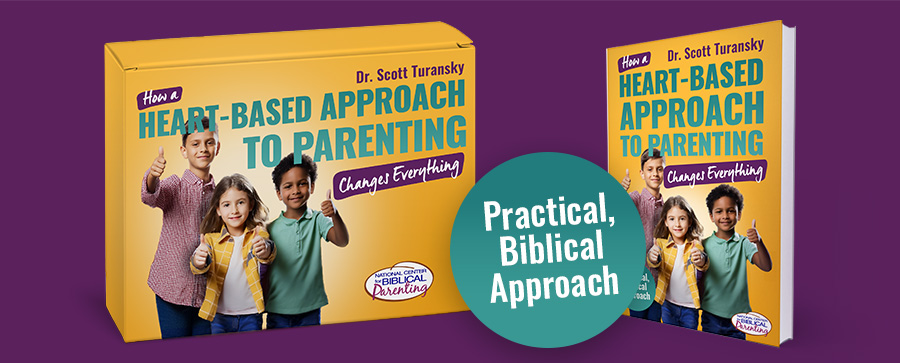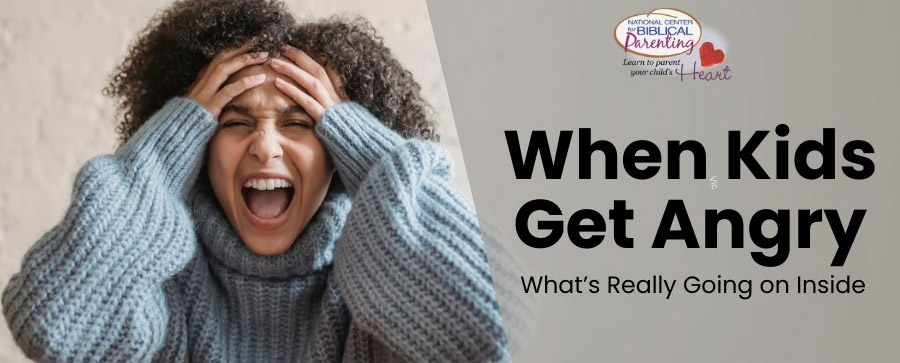When Kids Get Angry: What’s Really Going On Inside

Anger in children can be loud, messy, and disruptive. It may come with stomping feet, slammed doors, tears, or defiance. As a parent, it’s easy to focus on the behavior—because that’s what you see. But if we only respond to the surface-level expression, we miss an incredible opportunity to shape the heart.
Many parents approach anger with urgency. “Stop it right now.” “Calm down.” “Go to your room.” These responses are understandable in the moment, especially when the house feels like it’s unraveling. But what if there were a deeper way to help your child—one that doesn’t just manage the moment but trains their heart for a lifetime?
Let’s take a look inside the storm of anger and discover how a heart-based approach can help both you and your child respond differently.
Anger is a Signal, Not the Real Problem
Think of anger like a warning light on your car’s dashboard. When it flashes, you know something’s going on under the hood. You wouldn’t just smash the dashboard light and expect the engine to be fine. Yet that’s often what happens when we tell kids to “just stop” being angry. We silence the signal without addressing the underlying issue.
Anger is usually a secondary emotion. Behind it may be frustration, fear, shame, or disappointment. A child who explodes because they “never get a turn” may be dealing with an internal sense of injustice. A child who yells when a parent says “no” may be struggling with entitlement or unrealistic expectations. Anger gives us clues about what’s happening in the heart.
As parents, our job is not just to suppress the emotion but to explore it. “What’s going on inside right now?” is a much more powerful question than “What’s wrong with you?” Helping children connect their feelings to deeper beliefs is a transformative step in emotional growth.
Training, Not Just Correction
Most anger episodes don’t resolve with a single conversation. What kids need is training. Just as you’d teach your child to ride a bike or tie their shoes, they also need practice handling big feelings. A heart-based parent sees anger as a skill-building opportunity, not just a behavioral issue to correct.
Training involves both instruction and experience. You might sit with your child after a meltdown and say, “Let’s talk about what happened. What were you feeling when your sister changed the channel?” You’re helping your child name their emotions and see the sequence that led to the explosion. Then, you guide them to develop a plan: “Next time you feel that way, what could you do instead of yelling?”
The key here is practice. Children don’t master emotional regulation overnight. That’s why it’s important to put them in low-stakes, controlled situations where they can rehearse better responses. Maybe you play a game where they intentionally lose and practice using calm words. Or perhaps you role-play a frustrating homework moment and walk through it together with a script.
Training also means celebrating small wins. If your child starts to recognize their triggers or uses a new phrase instead of yelling, affirm it! You’re building emotional muscle, one moment at a time.
Empowering Your Child with a Plan
Many children feel powerless when anger rises. They don’t know what to do with the surge of emotion. Instead of relying on punishment or lectures, a heart-based approach gives them tools—and responsibility.
Help your child develop their own anger plan. This gives them ownership and makes them an active participant in their growth. Their plan might include:
- Things to say to themselves (“It’s not worth it,” or “Take a breath”)
- Things to do (“Walk to my calm spot,” “Get a drink of water”)
- People to ask for help (“Ask Mom for a hug,” or “Tell Dad I need space”)
As a parent, you’ll have your own plan too. You might step back instead of escalating. You may pre-load calming strategies during peaceful times. Your plan is about structuring family life to support emotional growth.
Over time, you want your child to internalize the truth: “This is my problem, and I can grow.” That mindset moves them from reactive to proactive, from explosive to resilient.
Invite God Into the Emotional Journey
Parenting the heart means you don’t do this alone. God cares deeply about our emotions—and He offers both comfort and strength for the journey. Throughout Scripture, we find examples of God meeting people in their emotional turmoil with the phrase, “I will be with you.”
- To Jacob, God promised presence on a hard journey (Genesis 28:15).
- To Moses, He offered companionship in overwhelming leadership (Exodus 3:12).
- To Joshua, He gave strength and courage for the unknown (Joshua 1:9).
- To us, Jesus says, “Peace I leave with you… Do not let your hearts be troubled” (John 14:27).
Teaching your children that God is with them—even in their anger—is a profound gift. It helps them realize they are not alone and that their emotions don’t scare God. You might encourage them to memorize a short verse like Psalm 56:3—“When I am afraid, I put my trust in you”—and use it as a calming phrase in moments of emotional overload.
Even better, model this for your children. Let them see you pause, pray, and reset when your own anger rises. Your example gives them a living blueprint of what emotional maturity looks like.
The Bottom Line: Big Emotions Are a Big Opportunity
Anger isn’t the enemy. It’s a teacher. It reveals what’s happening in your child’s heart and gives you the chance to come alongside them with compassion, wisdom, and training.
When you shift from control to coaching, from reacting to training, you’ll not only see fewer outbursts—you’ll help your child grow into a person who handles emotions with strength and grace. That’s the power of a heart-based approach.
Want more practical tools to help your kids with emotions, defiance, responsibility, and more?
Check out the course How a Heart-Based Approach Changes Everything and discover fresh strategies grounded in scripture, child development, and real-life solutions.
You don’t have to parent alone—and your child doesn’t have to be stuck. Start the journey today.



Leave a Reply
Want to join the discussion?Feel free to contribute!